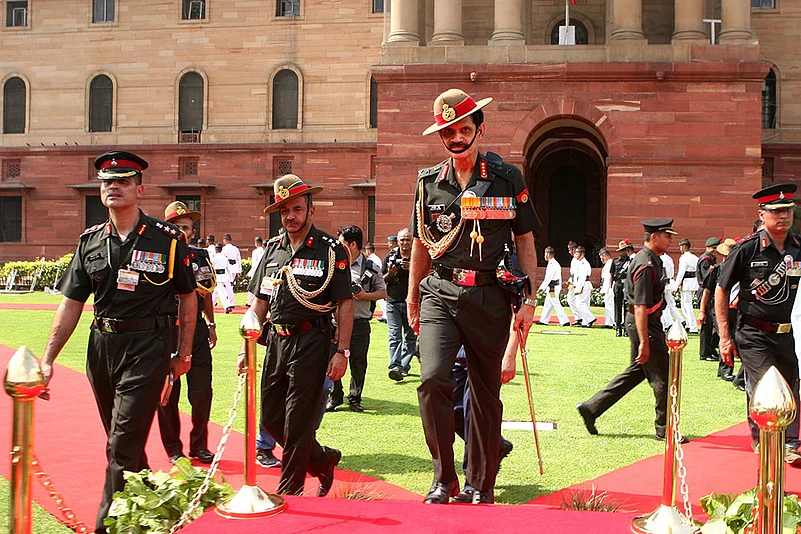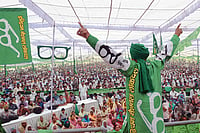Crossing Lines
From a professional, apolitical army, is the fifth largest army in the world getting increasingly politicised?
- General V.K. Singh (retd) is the first army chief to become a minister.
- The former chief had triggered a controversy by claiming that the army regularly paid ministers in J& K.
- Under present chief, General Suhag, the army invited Baba Ramdev to address officers and sent soldiers to Ramdev’s ashram for training
- Retired Colonel Karan Kharab wrote in the RSS mouthpiece Organiser to warn about the ‘fifth columnists’ within the armed forces
***
The Art of Living event has been captured in a photo that went viral—not one of grand spectacle but armymen in fatigues building pontoon bridges for a private event. The presence of PM Modi and a few ministers at the event has added to the fodder for critics who blame the army for dancing to the tune of politicians. It’s an accusation that has been increasingly heard ever since the current regime took over. And it’s easy to see why.
Only recently, 250 soldiers sourced from the Western Command attended the Yoga Teacher’s Training Course organised by Baba Ramdev at his centre in Haridwar. Another 750 will follow soon. And during the Jat agitation in Haryana, the forces were called in to control what was a law and order problem usually handled by police and the CRPF.
For a force that has steadfastly remained aloof from political pressure and is still considered to be a secular institution in the country, the signs are not kosher. And the man in the firing line is its chief, General Dalbir Singh Suhag. Outlook found many of his senior officers aghast over the army’s involvement in the Sri Sri event. “Normally if we take a vehicle out of the area of jurisdiction, we have to pay the treasury. There is no free lunch in the army,” warns one. Yet a person who refuses to pay fines levied by the National Green Tribunal hosts the prime minister the same evening. “Ravi Shankar will never be charged by the army for building the bridges under a pliable general,” laments a commander in Delhi.
General Suhag is yet to clarify if the army charged AOL for its efforts. But it is widely accepted that “misuse” of this nature “brings disgrace to the institution of army,” says Dr Ajay Sahani, executive director of the Institute for Conflict Management. The decision is not illegal, he elaborates, but nonetheless constitutes abuse of authority given to the political executive. “The army is not to be treated like a domestic help,” he asserts. Adds Congress spokesperson and lawyer Abhishek Singhvi: “It’s a question of using national resources, especially the elite unit of the army, for a private society or a person. It negates the Indian constitution in letter and spirit. This government has repeatedly violated this basic convention—whether in the case of Baba Ramdev or Art of Living.”

The State And the Patrician The army seen with the PM
Outlook spoke to three former chiefs of the army staff. Most refused to go on record, but said categorically that they would have not allowed this to happen. Former army chief Deepak Kapoor’s reply was terse and rhetorical. “Where do you draw a line?” he asks. “I don’t know what circumstances led to the decision (by Gen Suhag) but (for) a private event it’s not appropriate for the army to carry out tasks.”
In a career spanning four decades, Gen Suhag has been a company commander in Operation Pawan in Sri Lanka, commanded a Rashtriya Rifles battalion in Nagaland, besides commanding an infantry brigade and a mountain division in Jammu & Kashmir, and 3 Corps in Eastern Command. And he has courted controversies. Even his appointment as chief of army staff (one of the last executive decisions of the outgoing UPA regime) made news for all the wrong reasons. Former chief of army staff and now minister of state foreign affairs, Gen V.K. Singh, had made an infamous tweet in June 2014 blatantly accusing Lt Gen Suhag of protecting criminals in uniform. “If unit kills innocents, does dacoity and then head of organisation tries to protect them, should he not be blamed? Criminals should go free!!!” (sic).
He was referring to a December 2011 raid conducted on the house of a contractor in Jorhat, Assam, by a military intelligence unit when Suhag commanded the 3 corps in Dimapur, Nagaland. V.K. Singh had slapped a disciplinary and vigilance ban on Suhag, effectively preventing him from becoming army chief when his turn came. (All this was in the midst a lot of chatter about succession wars in the army, with Gen Singh’s age controversy apparently being directly related to who could come in the line of succession.) After V.K. Singh retired duly, his successor, Gen Bikram Singh, promptly cancelled the ban on Suhag, enabling him to rejoin the queue for the top post.

The State And the Patrician The army at work on the Yamuna for Sri Sri (Photograph by Tribhuvan Tiwari)
Bikram Singh refused to speak on Suhag, offering “no comments,” but former defence minister Arun Jaitley’s words on the floor of the House in June 2014 offered a cue on how the NDA regime is favourably disposed towards Suhag (despite his former bugbear V.K. Singh being a minister). The new government “fully defends” Gen Suhag’s elevation, he had said. “The UPA had made the appointment some weeks ago. It’s been a practice to keep some issues outside the realm of inter-party politics...we must keep the army and its appointments out of this arena.” That relationship has now blossomed. For, in defence ministry circles, it is no secret that Gen Suhag is close to Ajit Doval, the national security advisor. Doval and Suhag had skipped their official trips to Bangladesh and the UK respectively to camp in Manipur during India’s cross-border retaliation for the June 2015 killing of 18 armymen by NSCN(K). They coordinated Indian army strikes inside Myanmar, earning both laurels and brickbats (depending on who you asked) for violating the international border. “Only a pliable general will allow a civilian to micromanage an army operation” says a former military intelligence chief. Similarly, while the NSG-led operation against the terrorist attack on Pathankot airbase was celebrated by the army as a “complete success”—in the words of the GOC-in-C, Lt Gen K.J. Singh—doing so without the army actually participating in it and giving full credit to Doval is a bit embarrassing. The army chief, who is also joint chief of defence staff, is said to have facilitated the larger role of Doval in the Pathankot op.
Soon after Gen Suhag’s elevation, maverick BJP leader Subramanian Swamy wrote a letter to the President expressing apprehension that the new chief will ‘politicise’ and ‘demoralise’ the armed forces. He forwarded the letter to the CBI too, creating a furore in the corridors of power. His letter alleged ‘procurement scams’ in the secretive Special Frontier Force (Suhag was inspector general), and alleged payoffs for the purchase of parachutes, night vision device and weaponry. Swamy also mentions Jorhat, where the house of Renu Gogoi was robbed by armymen of a unit led by Capt Rubina Kaur Keer. No chargesheet was ever filed. (Suhag was then 3 Corps commander.) Swamy writes, “The Jorhat case has a direct bearing on AFSPA, a critical shield to protect the army from false cases. So, it is vital for AFSPA itself not to come under a cloud—the highest levels of the army cannot be seen to be shielded out of a sense of false loyalty.” Swamy’s attack was at the UPA regime but it indicted Suhag.
More recently, it’s Suhag’s willingness to do the government’s bidding that has led to criticism. Brig V. Mahalingam, a defence analyst, calls it a wrong precedent. The army chief, he says, is the custodian of a whole tradition, and his dealings should reflect that role. “I think he has failed in his moral duty to see the troops are employed properly. The politicians and the bureaucracy have no clue how to employ the army. He’s a weak general who’s politically pliable.” General Suhag has not responded to requests for interview. But he clearly has many questions to ponder over.


























